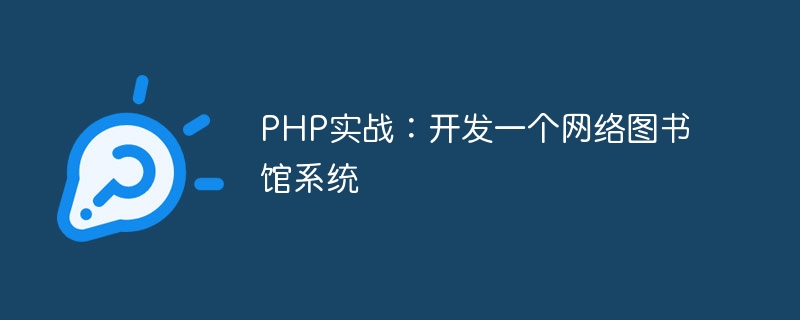Home >Backend Development >PHP Tutorial >PHP practice: developing an online library system
PHP practice: developing an online library system
- 王林Original
- 2023-10-27 08:36:46750browse

PHP Practical Combat: Developing an Online Library System
With the development of technology and the improvement of people’s living standards, the development of online library systems has also become more and more important. The more important it is. An online library system allows users to easily access and borrow books, while also making it easy for administrators to manage the circulation and return of books. As a commonly used server-side scripting language, PHP provides a lot of convenience for developing online library systems. This article will introduce how to use PHP to develop a simple but fully functional online library system.
First, we need to design the database to store the data in the library system. We can create a data table called "books" that contains the following fields: book number, book title, author, publisher, and quantity. In addition, we can also create a data table named "users", which contains the following fields: user ID, user name, password and role (such as administrator or ordinary user). Through the association of these two tables, we can realize the basic functions of the library system.
Next, we need to create a login page to allow users to log in to the system by entering their username and password. In PHP, we can use Session to save the user's login status. When the user successfully logs in, the system will save the user information in the Session for subsequent page use. When the user clicks the "Logout" button, the system will delete the Session information to implement the user's logout function.
On the system homepage, we can display a list of all books that can be borrowed. A borrow button appears below each book. When the user clicks the borrow button, the system checks whether the quantity of the book is greater than 0. If it is, then reduce the number of books by 1 and update the number of books in the database. The system will also add a borrowing record to the data table "borrow_history" to record the borrowing user, book, borrowing date and other information.
The system also needs to provide a book return function. Users can view the books they have borrowed on the personal center page and select the books they want to return. When the user clicks the return book button, the system will increase the number of returned books by 1 and update the number of books in the database. At the same time, the system will also delete the corresponding borrowing records from the "borrow_history" table.
After logging in to the system, administrator users can enter the administrator page to manage books. Administrators can add new books to the database, "books" table, including book number, title, author, publisher and quantity. Administrators can also delete or modify information about existing books. Administrators can view all borrowing records and perform query, sort, and export operations as needed.
In addition to the above functions, we can further expand the functions of the library system. For example, you can add a search function that allows users to find books based on keywords such as title, author, or publisher. You can also add a rating and review feature that allows users to recommend their favorite books to other users. In addition, you can also add an administrator review process, requiring users to go through the administrator's review before borrowing books.
In short, PHP, as a powerful scripting language, provides a lot of convenience for developing an online library system. Through a well-designed database and reasonable page development, we can implement a simple but fully functional online library system. Both users and administrators can conveniently borrow and manage books through this system, improving the efficiency and service quality of the library. I hope this article will be helpful to readers who are learning and using PHP to develop network library systems.
The above is the detailed content of PHP practice: developing an online library system. For more information, please follow other related articles on the PHP Chinese website!
Related articles
See more- The most comprehensive PHP mall system practical project video tutorial on the Internet
- 2021 Popular PHP Development Framework Ranking
- How to configure the PHP development environment with vscode (Visual Studio Code) (tested)_Programming Development_Software Tutorial
- What is it like to do PHP development in a game company?
- vscode configure php development environment

